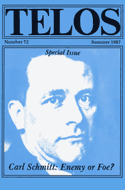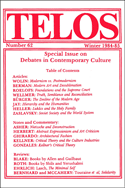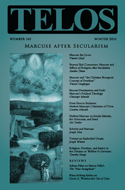By Linas Jokubaitis · Tuesday, January 28, 2014 As an occasional feature on TELOSscope, we highlight a past Telos article whose critical insights continue to illuminate our thinking and challenge our assumptions. Today, Linas Jokubaitis looks at Carl Schmitt’s “The Legal World Revolution” from Telos 72 (Summer 1987).
 Carl Schmitt wrote “The Legal World Revolution” when he was ninety years old, and it turned out to have been his last publication. New political developments had forced him to restate some of his old positions, the most important of which was the relationship between legitimacy, legality, and super-legality. The guiding theme of Schmitt’s final publication was the one that had been of the highest importance during his whole career. It is best summarized in notes posthumously published as Glossarium, in a passage entitled “The Diagnostic and Prognostic of Max Weber,” where Schmitt quoted from Weber’s “Sociology of Law”: “As a result of technical and economic development, it is inevitable that current law is destined to be conceived more and more as a rational technical mechanism which can be modified at any time for functional purposes, and is lacking in any kind of sacred content. The destiny may be hidden by the suppleness of belief of the current law, but cannot be truly avoided.” Carl Schmitt wrote “The Legal World Revolution” when he was ninety years old, and it turned out to have been his last publication. New political developments had forced him to restate some of his old positions, the most important of which was the relationship between legitimacy, legality, and super-legality. The guiding theme of Schmitt’s final publication was the one that had been of the highest importance during his whole career. It is best summarized in notes posthumously published as Glossarium, in a passage entitled “The Diagnostic and Prognostic of Max Weber,” where Schmitt quoted from Weber’s “Sociology of Law”: “As a result of technical and economic development, it is inevitable that current law is destined to be conceived more and more as a rational technical mechanism which can be modified at any time for functional purposes, and is lacking in any kind of sacred content. The destiny may be hidden by the suppleness of belief of the current law, but cannot be truly avoided.”
Continue reading →
By Herman Westerink · Monday, January 27, 2014 This is the last of three papers delivered at a seminar on religion and politics that was organized with Rowan Williams, the former archbishop of Canterbury, on the occasion of his recent book Faith in the Public Square. The seminar was held at Radboud University in December 2013. The first paper, by Martijn de Koning, appears here, and the second paper, by Chantal Bax, appears here.
It has been a real pleasure to read Rowan Williams’s book Faith in the Public Sphere, not the least because of one of the first statements in the introduction: “Archbishops grow resilient and sometimes even rebellious” in the face of all possible forms of critique archbishops can expect to receive when commenting public issues. A rebellious archbishop—what more can the reader wish? An archbishop willing to take the risk of “blundering into unforeseen complexities” when trying to find the connecting points between various public questions with religious faith. No blundering as far as I can tell, but a risk, yes, there is always a risk when talking about Faith in the Public Sphere, or having faith, being faithful, in the public sphere. This is not only a risky undertaking for an archbishop, but probably for every modern believer since the days of Ignatius and Calvin, who realizes that there is a tension between good civil behavior and raising one’s voice of conscience. Hence, that there is a fundamental tension between faith and the public sphere in modernity—a tension that cannot be resolved, but should actually be regarded to be constitutive and constructive for both faith and the public sphere itself. Having read the book, it seems to me that Williams has set himself the task of showing how constructive this tension can be.
Continue reading →
By Chantal Bax · Friday, January 24, 2014 This is the second of three papers delivered at a seminar on religion and politics that was organized with Rowan Williams, the former archbishop of Canterbury, on the occasion of his recent book Faith in the Public Square. The seminar was held at Radboud University in December 2013. The first paper, by Martijn de Koning, appears here. The third paper, by Herman Westerink, will be posted here shortly.
According to the publisher of Faith in the Public Square, “Archbishop Rowan Williams is the most gifted Anglican priest of his generation. His views are consistent and orthodox and yet he has been consistently misunderstood.” Now maybe this is just another case of misunderstanding, but I doubt, not whether Rowan Williams is the most gifted priest of his generation, but whether his views are really that orthodox. In my understanding of that term—though I should stress that my vocabulary is not first and foremost theological—Faith in the Public Square is far from an orthodox book. It is unafraid to challenge received opinions, both religious and other kinds. This for instance shows itself in Williams’s consistent challenging of a dichotomy that has long shaped Western social and political thought, namely that of Gemeinschaft versus Gesellschaft, or of community versus society. What I am referring to is the idea that there is a sharp distinction between, on the one hand, traditional social bonds based on a robust shared identity resulting in organic solidarity—that would be Gemeinschaft—and on the other hand typically modern organizations of collective life in the form of negotiated interests and impersonal contracts—which would be Gesellschaft (and I’ll stick to the German terms because these bring out the contrast most clearly).
Continue reading →
By Beau Mullen · Wednesday, January 22, 2014 As an occasional feature on TELOSscope, we highlight a past Telos article whose critical insights continue to illuminate our thinking and challenge our assumptions. Today, Beau Mullen looks at Martin Jay’s “Hierarchy and the Humanities: The Radical Implications of a Conservative Idea” from Telos 62 (Winter 1984).
 The notion of “high culture” has been under attack in different ways by critics, academics, and the general public for generations. Moreover, as Western culture becomes increasingly commercialized, egalitarian impulses have exiled much of what was considered by many to be high culture to obscurity, appreciated mainly by a minority who are themselves regarded as cultural elitists. Popular or mass culture appears to now reign supreme, but this does not mean that cultural hierarchy has been brought to an end. Cultural hierarchy still has its defenders, and as Martin Jay suggests in his 1984 Telos article “Hierarchy and the Humanities: The Radical Implications of a Conservative Idea,” it clearly has a place in current cultural evaluations. The notion of “high culture” has been under attack in different ways by critics, academics, and the general public for generations. Moreover, as Western culture becomes increasingly commercialized, egalitarian impulses have exiled much of what was considered by many to be high culture to obscurity, appreciated mainly by a minority who are themselves regarded as cultural elitists. Popular or mass culture appears to now reign supreme, but this does not mean that cultural hierarchy has been brought to an end. Cultural hierarchy still has its defenders, and as Martin Jay suggests in his 1984 Telos article “Hierarchy and the Humanities: The Radical Implications of a Conservative Idea,” it clearly has a place in current cultural evaluations.
Continue reading →
By Joseph Diaz · Tuesday, January 21, 2014 Joseph Diaz’s “Schmitt and Marcuse: Friends, Force, and Quality” appears in Telos 165 (Winter 2013). Read the full version online at the Telos Online website, or purchase a print copy of the issue in our store.
 This article aims at exploring the potential for a politically operative theory of opposition to liberalism’s stultifying politics of process. Given their formal political positionality as critics of liberal neutrality, as well as their historically particular relationship to some of the most volatile politics of the twentieth century, Marcuse and Schmitt cannot but be brought into discourse with one another in the most pressing of times, for three reasons. First, by exploring the modalities of their respective criticisms, this article locates an enemy common to both thinkers in the neutralization of the political through the attempted elimination of the decision. Second, in using Schmitt’s framework of the friend-enemy distinction, further investigation into the potential complicities between anti-liberal thought illuminates the limitations of founding political friendship on mere enemy identification alone. This article aims at exploring the potential for a politically operative theory of opposition to liberalism’s stultifying politics of process. Given their formal political positionality as critics of liberal neutrality, as well as their historically particular relationship to some of the most volatile politics of the twentieth century, Marcuse and Schmitt cannot but be brought into discourse with one another in the most pressing of times, for three reasons. First, by exploring the modalities of their respective criticisms, this article locates an enemy common to both thinkers in the neutralization of the political through the attempted elimination of the decision. Second, in using Schmitt’s framework of the friend-enemy distinction, further investigation into the potential complicities between anti-liberal thought illuminates the limitations of founding political friendship on mere enemy identification alone.
Continue reading →
By Martijn de Koning · Monday, January 20, 2014 This is the first of three papers delivered at a seminar on religion and politics that was organized with Rowan Williams, the former archbishop of Canterbury, on the occasion of his recent book Faith in the Public Square. The seminar was held at Radboud University in December 2013. The second and third papers will be posted in the near future.
Rowan Williams’ book Faith in the Public Square, which is based upon several lectures, should not be read as a compendium of political theology, but instead as a “series of worked examples of trying to find the connecting points between various public questions and the fundamental beliefs about creation and salvation” (p. 2). I read the book as an attempt by Williams to provide the reader with themes, thoughts, and questions which are relevant to current debates about what kind of society we want to construct, how we should deal with pluralism, and how we might engage with any conflict between the religious and the secularist in contemporary society. And that is exactly what it does.
Continue reading →
|
|
 Carl Schmitt wrote “The Legal World Revolution” when he was ninety years old, and it turned out to have been his last publication. New political developments had forced him to restate some of his old positions, the most important of which was the relationship between legitimacy, legality, and super-legality. The guiding theme of Schmitt’s final publication was the one that had been of the highest importance during his whole career. It is best summarized in notes posthumously published as Glossarium, in a passage entitled “The Diagnostic and Prognostic of Max Weber,” where Schmitt quoted from Weber’s “Sociology of Law”: “As a result of technical and economic development, it is inevitable that current law is destined to be conceived more and more as a rational technical mechanism which can be modified at any time for functional purposes, and is lacking in any kind of sacred content. The destiny may be hidden by the suppleness of belief of the current law, but cannot be truly avoided.”
Carl Schmitt wrote “The Legal World Revolution” when he was ninety years old, and it turned out to have been his last publication. New political developments had forced him to restate some of his old positions, the most important of which was the relationship between legitimacy, legality, and super-legality. The guiding theme of Schmitt’s final publication was the one that had been of the highest importance during his whole career. It is best summarized in notes posthumously published as Glossarium, in a passage entitled “The Diagnostic and Prognostic of Max Weber,” where Schmitt quoted from Weber’s “Sociology of Law”: “As a result of technical and economic development, it is inevitable that current law is destined to be conceived more and more as a rational technical mechanism which can be modified at any time for functional purposes, and is lacking in any kind of sacred content. The destiny may be hidden by the suppleness of belief of the current law, but cannot be truly avoided.”  The notion of “high culture” has been under attack in different ways by critics, academics, and the general public for generations. Moreover, as Western culture becomes increasingly commercialized, egalitarian impulses have exiled much of what was considered by many to be high culture to obscurity, appreciated mainly by a minority who are themselves regarded as cultural elitists. Popular or mass culture appears to now reign supreme, but this does not mean that cultural hierarchy has been brought to an end. Cultural hierarchy still has its defenders, and as Martin Jay suggests in his 1984 Telos article “Hierarchy and the Humanities: The Radical Implications of a Conservative Idea,” it clearly has a place in current cultural evaluations.
The notion of “high culture” has been under attack in different ways by critics, academics, and the general public for generations. Moreover, as Western culture becomes increasingly commercialized, egalitarian impulses have exiled much of what was considered by many to be high culture to obscurity, appreciated mainly by a minority who are themselves regarded as cultural elitists. Popular or mass culture appears to now reign supreme, but this does not mean that cultural hierarchy has been brought to an end. Cultural hierarchy still has its defenders, and as Martin Jay suggests in his 1984 Telos article “Hierarchy and the Humanities: The Radical Implications of a Conservative Idea,” it clearly has a place in current cultural evaluations.  This article aims at exploring the potential for a politically operative theory of opposition to liberalism’s stultifying politics of process. Given their formal political positionality as critics of liberal neutrality, as well as their historically particular relationship to some of the most volatile politics of the twentieth century, Marcuse and Schmitt cannot but be brought into discourse with one another in the most pressing of times, for three reasons. First, by exploring the modalities of their respective criticisms, this article locates an enemy common to both thinkers in the neutralization of the political through the attempted elimination of the decision. Second, in using Schmitt’s framework of the friend-enemy distinction, further investigation into the potential complicities between anti-liberal thought illuminates the limitations of founding political friendship on mere enemy identification alone.
This article aims at exploring the potential for a politically operative theory of opposition to liberalism’s stultifying politics of process. Given their formal political positionality as critics of liberal neutrality, as well as their historically particular relationship to some of the most volatile politics of the twentieth century, Marcuse and Schmitt cannot but be brought into discourse with one another in the most pressing of times, for three reasons. First, by exploring the modalities of their respective criticisms, this article locates an enemy common to both thinkers in the neutralization of the political through the attempted elimination of the decision. Second, in using Schmitt’s framework of the friend-enemy distinction, further investigation into the potential complicities between anti-liberal thought illuminates the limitations of founding political friendship on mere enemy identification alone.

